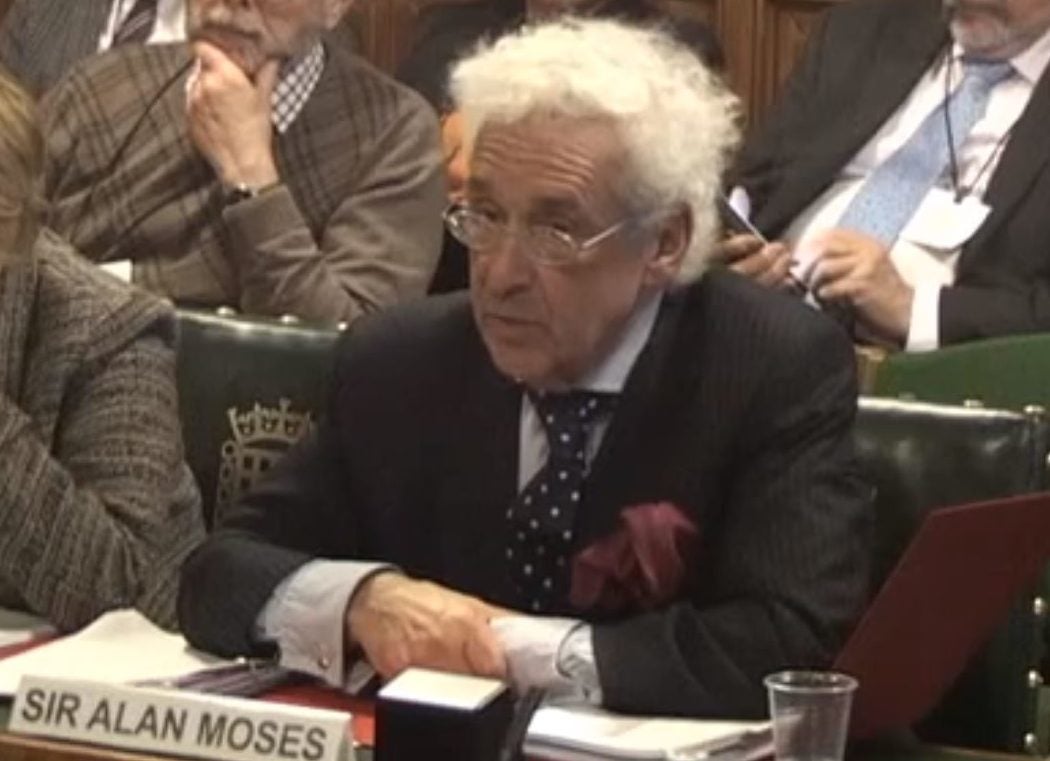
The chairman of UK press watchdog the Independent Press Standards Organisation has said it would be “very dangerous” to tell newspapers not to publish pictures of terrorists.
Several French publications decided in 2016 to stop publishing pictures of those responsible for terrorist killings, with Le Monde saying it wanted to avoid their “posthumous glorification”.
Sir Alan Moses (pictured), who has chaired IPSO since it was set up in 2014, was asked at the press regulator’s annual lecture last night whether he could see a time in which British media stopped publishing pictures of terrorists.
He said telling the press not to show an image “becomes very dangerous”, adding: “[It would be] very difficult to say don’t show it, even though there will be people who saw that who would have been in part excited and inspired by that.”
Last month, following the mosque attacks in Christchurch, New Zealand, Guardian editor Katharine Viner said she disagreed with the country’s prime minister Jacinda Ardern that the attacker should be rendered “nameless”.
Viner said: “The role of a news organisation is different from the role of a politician or a political party – our responsibility is to report the facts, contextualise events, and work with our readers to understand what’s going on. Not reporting the terrorist’s name would undermine those efforts.”
Sara Khan, the lead commissioner for countering extremism, shared a similar view at last night’s event after delivering the annual IPSO lecture on the media’s role in challenging extremism.
On the publication of terrorist pictures, she said: “It’s a very difficult question to answer because, on the one hand, from where I’m sitting I want to know about people who have been drawn into terrorism, I want to know their background, I want to know what radicalised them.”
She added: “In one sense it’s really important that the press shines a light on them, where they grew up… it’s all about striking that balance and understanding where that balance is where you’re not glorifying them.
“But actually it’s about the accuracy, it’s about putting the context on them and informing the public about who they are and their background, what society should be doing about it.”
Sir Alan praised three points made by Khan in her speech, saying they “tolled very heavily” with him.
The first of these was Khan saying that as a Muslim woman herself, “sweeping statements, lazy stereotypes and loose reporting can demonise and misrepresent entire communities, unwittingly contribute to xenophobia and play into the hands of extremists”.
She also said “language and tone matters”, and urged the press to “report accurately and do not implicate whole communities or conflate the actions of an individual or organisation with an entire community”.
Sir Alan said IPSO did not “in any way approve or condone the ignorant or at worst malicious publications in relation to the unnecessary stigmas imposed on groups”. “But,” he added, “we must never forget that the price of liberty of expression has always been the cost of the principle that no one has any right not to be offended…”
IPSO is currently drafting non-binding guidelines on the reporting of Islam and Muslims in the UK.
In her speech at Church House, Westminster, last night, Khan urged the press to “think about how words matter”.
She said: “‘Traitors’ and ‘Nazis’ are terms regularly used to denigrate political opponents and the language of ‘nooses’ is deemed acceptable. Dog whistle politics is something we see with increased frequency.
“In these polarised times, I would urge the press to think about how words matter. We all have an ethical and moral responsibility to restore the red line of civility.”
She also praised journalists, saying: “You expose extremists and their activities for what they are and we should applaud you more for it.”
She went on: “As one journalist friend put it to me: ‘Journalism is a blunt but effective instrument – a bullshit detector.’ And hypocrisy and double standards are one of the many things that extremists at both ends of the extreme have in common.
“So as a counter-extremist, I see you among my own and I offer you my support and admiration.”
Khan said challenging extremism was “complex” and “must be done while protecting and preserving media freedom”. She said that without such freedoms, “there is little to demarcate us from totalitarian and extremist regimes”.
“Shutting down discussion, censoring debates – no matter how controversial a topic – is counter-productive. I believe we need more speech, more debate, more open discussion to counter extremism, not less.
“Because reasoned, evidence-based debate is at the heart of our values. It’s how we in this country have isolated extremists to a greater extent than most of our neighbours. But that stability is at greater risk now than any in my lifetime.
“I firmly believe that it is possible to get the balance right between press freedom and the need to limit the oxygen of publicity extremists so desperately crave. To conclude, never before has a free, independent and vigilant media been so vital.
“You play a critical role in what I call a ‘whole society’ approach to challenging extremism. That is, that everyone has their part to play – and your part is vast.
“You expose extremists and their activities for what they are and we should applaud you more for it. But when reporting on extremism, the principles of quality journalism matter hugely, rigorous in its analysis, scrupulous in its regard for facts.”
Picture: ParliamentTV/Screenshot
Email pged@pressgazette.co.uk to point out mistakes, provide story tips or send in a letter for publication on our "Letters Page" blog
